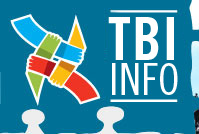Do families experience grief when faced with a TBI?
Usually associated with death, grief also occurs in other contexts of loss, such as when a TBI is diagnosed.
Stages of the Grieving Process [1]
Transformation
Coping
Depression
Loss
Anger
Guilt
Shock
Denial
Anxiety This stage occurs before the family knows the diagnosis but recognizes that the person has problems. They don’t know where the problems came from or what will come of it. The family is anxious and sad, feels powerless and alternates between hope and despair.
Shock A TBI diagnosis is a shock; it triggers a family crisis and paralyses family activities.
Denial Initial shock is gradually replaced by growing anxiety. Denial takes over, with doubts that the accident ever took place. When this mechanism proves to be insufficient to contain their anxiety, the reality of the situation is rejected, since it is unbearable. A new reality is constructed, without the TBI. Denial goes beyond saying that the information cannot be true; people completely erase it from their minds. It must be said that these are mechanisms that nevertheless help the family adjust to the new situation.
Anger Denial progressively disappears and reality slowly sinks in. This is expressed through rebellion and anger toward the injured person. This anger cannot be expressed, so it is aimed at other targets.
Guilt The anger toward the injured person slowly turns toward the loved one, who feels responsible for the injured person’s condition and will consider them as a form of living blame. This feeling can lead to overprotecting the injured person, which becomes particularly apparent when they try to learn how to become more autonomous.
Depression Anger and guilt allow the loved ones to gradually start expressing their sadness and identify the emotions that have been stirred by the situation. This period of depression marks the beginning of the process of accepting the situation resulting from the changes brought about by the TBI. It is a constructive period for loved ones, who now have a chance to reflect upon their own lives and feel sad for a more or less extended period of time.
Coping At this stage, loved ones learn to live with the residual disabilities, their limitations and the impacts on family and social life. They learn to recognize the skills of the injured person who, slowly, is reintegrated into the family.
Transformation In spite of what most theories on grief suggest, the grieving process does not seem to end with coping. Rather it involves the injured person and their family in a learning process which is transformational. Transformation is the family’s ability to feel competent and confident enough in their own resources and know-how to manage their daily lives and pursue new life objectives. Transformation operates at the level of a change in values, beliefs and knowledge. Families acquire new knowledge, develop new skills, become aware of the importance of collaborating and sharing resources, and gradually acknowledge and accept the fact that the brain-injured person has changed.
Recurrence Given that a TBI may improve or deteriorate, the grieving process is never really over.
Terms of Use | 2007-2008 All rights reserved © INFO-TBI. Graphic design : François Ménard | Design : WebConforme

